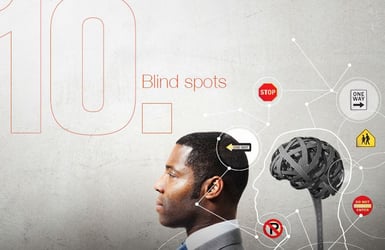You’re set on improving communication in your organization. You recognize barriers to effective leadership communication and work to push past them for a clear line of sight to engaged, motivated employees, productivity, shared understanding and profits.

What you may not expect is that you could also be one of your biggest barriers.
How could you be getting in your own way?
It’s most likely through blind spots. They’re things that are unknown to us yet obvious to others – areas of our vision we’re not able to see. Blind spots cause us to send signals we don’t intend, limiting our ability to effectively communicate.
There are a number of common blind spots but there are a few that top my list. If they apply to you, you might find yourself:
• Doing it alone: You think you can do it all without any help because your great work as an individual got you to where you are.
• Believing you’re always right: Ignoring others’ ideas and thoughts not only makes them feel undervalued, but it also limits your ability to succeed.
• Unwilling to admit when you’re wrong: Not being able to own up to mistakes or miscalculations is a sure-fire way to kill your credibility and trustworthiness.
The only way to overcome your blind spots is through input and feedback from others. Yes, you actually need feedback to be successful.
To be most aware of your blind spots, you should surround yourself with “truth tellers,” people who shed light on company issues and behaviors not as they should be or as you would like to see them, but as they actually are.
Smart communicators ask a lot of questions to solicit feedback from employees, colleagues, and peers; questions such as:
• How are we doing at (achieving this goal)?
• What three things do I do that serve us well?
• What three things can I do to be a better communicator?
Ask. Listen. Dig for specifics. Check for understanding. If you start to feel defensive based on feedback you get, hold back from defending yourself. As you may imagine, when you’re defensive, you’re less likely to respond to and act on the comments. An emotional response to feedback is a signal that you need to further reflect on the input someone’s shared with you. If something strikes a chord, then you’ve most likely been given insight into a potential blind spot.
Who are some truth tellers that you can surround yourself with in your organization?
-David Grossman
------------------------
Learn ways to avoid making unnecessary errors. Download the free eBook, The Greatest Mistakes (You Don't Want To Make), by clicking below.


Comments on this post